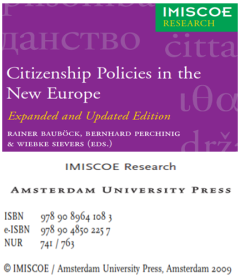Filter by

City in Sight
Huge social transformations and turbulent political events - 9/11 and the political murders of Pim Fortuyn and Theo van Gogh - have put urban issues high on the political agenda of the Netherlands
- Edition
- -
- ISBN/ISSN
- 9789089641694
- Collation
- -
- Series Title
- -
- Call Number
- 300 NIE c

Anthropological Explorations in Queer Theory
Anthropological Explorations in Queer Theory offers a wide ranging fusion of queer theory with anthropological theory, shifting away from the discussion of gender categories and identities that have often constituted a central concern of queer theory and instead exploring the queer elements of contexts in which they are not normally apparent. Engaging with a number of apparently 'non-sexual' to…
- Edition
- -
- ISBN/ISSN
- 1317180488
- Collation
- -
- Series Title
- -
- Call Number
- -

Citizenship Policies in the New Europe: Expanded and Updated Edition
The two most recent EU enlargements in May 2004 and in January 2007 have greatly increased the diversity of historic experiences and contemporary conceptions of statehood, nation-building and citizenship within the Union.
- Edition
- -
- ISBN/ISSN
- 9789089641083
- Collation
- -
- Series Title
- -
- Call Number
- 300 SIE c

Cidadania glocal, identidade nordestina; ética da comunicação na era da in…
Neste livro, encontra-se uma série de recomendações do professor José Marques de Melo, ou conforme suas próprias palavras "uma lição de casa" para as novas gerações colaborarem, de modo decisivo, com o avanço do ensino e da prática da comunicação em todas as regiões brasileiras.
- Edition
- -
- ISBN/ISSN
- 9788578791254
- Collation
- -
- Series Title
- -
- Call Number
- 300 MEL c

Italian Jewry in the Early Modern Era Essays in Intellectual History
Between the years 1550 and 1650, Italy's Jewish intellectuals created a unique and enduring synthesis of the great literary and philosophical heritage of the Andalusian Jews and the Renaissance`s renewal of perspective. While remaining faithful to the beliefs, behaviors, and language of their tradition, Italian Jews proved themselves open to a rapidly evolving world of great richness. The crisi…
- Edition
- -
- ISBN/ISSN
- 9781618112088
- Collation
- -
- Series Title
- -
- Call Number
- -

Games and Bereavement How Video Games Represent Attachment, Loss and Grief
How can videogames portray love and loss? »Games and Bereavement« answers this question by analysing five videogames and conducting a participatory design study with grievers. Sabine Harrer offers both theoretical and practical perspectives on videogames and grief and suggests a design model for videogames to include grievers into game development. Overall, she explores how videogames can be …
- Edition
- -
- ISBN/ISSN
- 9783837644159
- Collation
- -
- Series Title
- -
- Call Number
- -

Exemplary Bodies Constructing the Jew in Russian Culture, 1880s to 2008
Exemplary Bodies: Constructing the Jew in Russian Culture, 1880s to 2008 explores the construction of the Jew’s physical and ontological body in Russian culture as represented in literature, film, and non-literary texts from the 1880s to the present. With the rise of the dominance of biological and racialist discourse in the 1880s, the depiction of Jewish characters in Russian literary and cu…
- Edition
- -
- ISBN/ISSN
- 9781934843390
- Collation
- -
- Series Title
- -
- Call Number
- -

Art and Economics in the City New Cultural Maps
Emerging forms of alternative economy are changing the structure of society, redefining the relationship between centre and periphery in the urban fabric. In this context, the arts can play a crucial role in formulating a concept of complex and plural citizenship: This economic, social and cultural paradigm has the potential to overcome the conventional isolation of the arts and culture in ivor…
- Edition
- -
- ISBN/ISSN
- 9783837642148
- Collation
- -
- Series Title
- -
- Call Number
- -

Human Trafficking in Medieval Europe Slavery, Sexual Exploitation, and Prost…
Human trafficking has become a global concern over the last twenty years, but its violence has terrorized and traumatized its victims and survivors for millennia. This study examines the deep history of human trafficking from Late Antiquity to the Early Modern Period. It traces the evolution of trafficking patterns: the growth and decline of trafficking routes, the everchanging relationships be…
- Edition
- -
- ISBN/ISSN
- 9789463723336
- Collation
- -
- Series Title
- -
- Call Number
- -

Adaptation in the Age of Media Convergence
This collection considers new phenomena emerging in a convergence environment from the perspective of adaptation studies. The contributions take the most prominent methods within the field to offer reconsiderations of theoretical concepts and practices in participatory culture, transmedia franchises, and new media adaptations. The authors discuss phenomena ranging from mash-ups of novels and Yo…
- Edition
- -
- ISBN/ISSN
- 9789462983663
- Collation
- -
- Series Title
- -
- Call Number
- -
 Computer Science, Information & General Works
Computer Science, Information & General Works  Philosophy & Psychology
Philosophy & Psychology  Religion
Religion  Social Sciences
Social Sciences  Language
Language  Pure Science
Pure Science  Applied Sciences
Applied Sciences  Art & Recreation
Art & Recreation  Literature
Literature  History & Geography
History & Geography